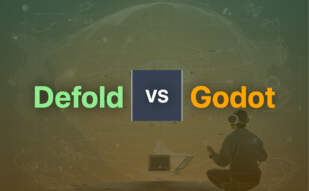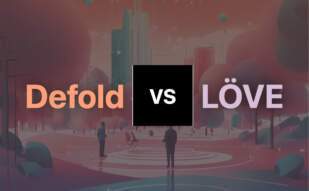Defold is a standout free game engine suitable for console, desktop, mobile, and web game development. With no upfront costs, licensing fees, or royalties, it appeals to developers for its user-friendly approach and extensive features. The platform, recognized for its ease of use and engaged community, offers game logic written in Lua and the option to implement native code for added functionality.

For those in search of alternatives to Defold, a diverse array awaits, including Unity, Unreal Engine, Godot, GameMaker, Solar2D, Construct, Construct 3, Phaser, Babylon.js, GDevelop, LÖVE, and Love2D.
Unity
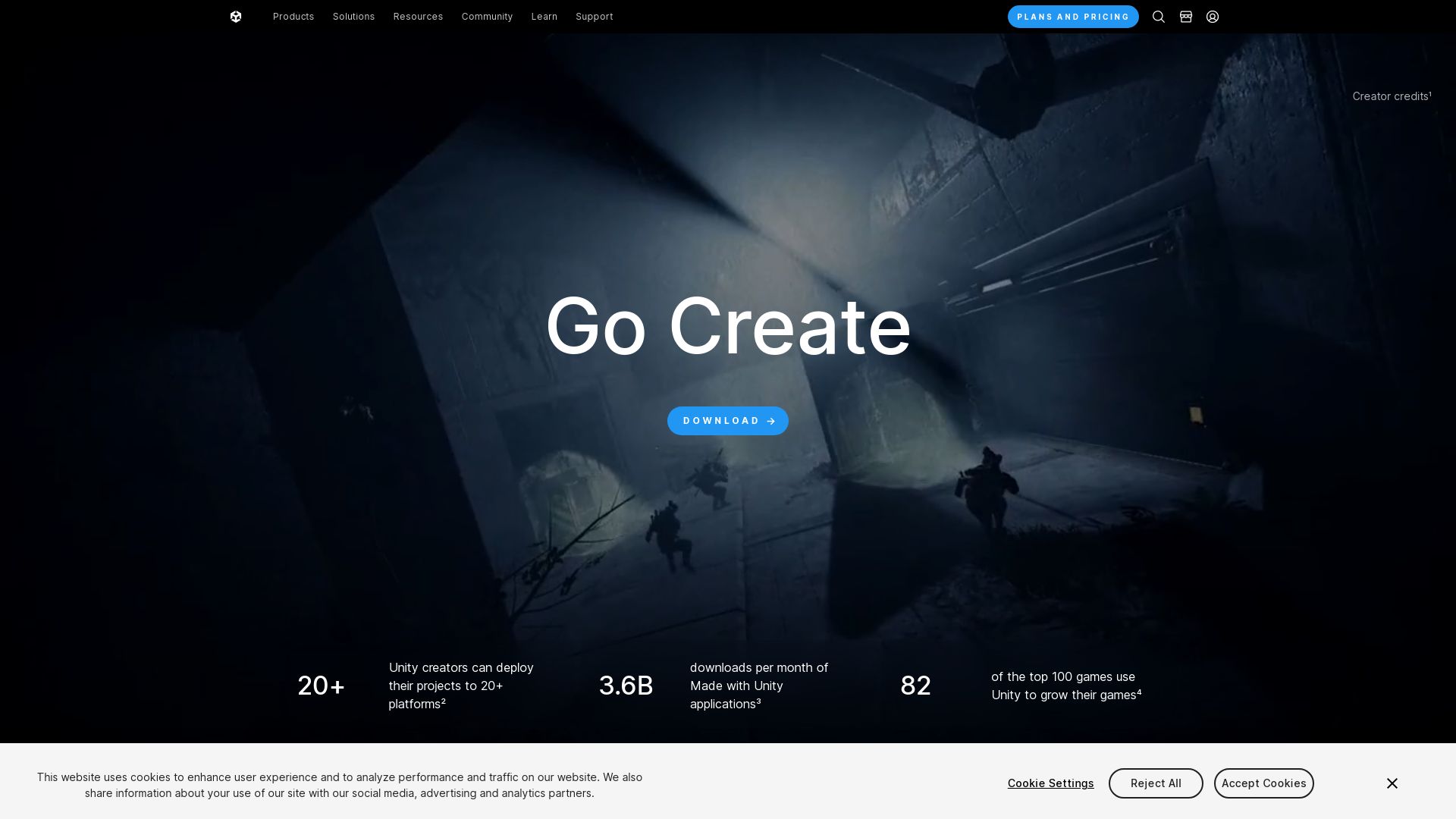
Meet Unity, a game-changer in the realm of game development engines. Launched in 2005, it’s an empowering platform for creating aesthetically captivating 3D and 2D games.
Unity Top Features
- Cross-platform launch: Enables distribution across Android, iOS, and multiple operating systems.
- Versatility: From Augmented Reality to 3D simulations, Unity doesn’t limit your creative horizons.
- Tool suite & features: Unity’s comprehensive collection aids the creation of high-quality games.
- Active community: A network of developers facilitating assistance, problem-solving and system improvement feedback.
- Varied coding languages: Options for BOO script, Javascript, and C#.
| Features | Benefits |
|---|---|
| Rich asset store | Pre-designed textures and features to spur game design brainstorming. |
| Evolving Tech | Continual advancements for user-friendly, compatible, and immersive visual experiences. |
| AR/VR features encouragement | Promotes the creation of mobile games and games with augmented reality/virtual reality features. |
Unity Limitations
- Unannounced changes undermined trust among its users.
- Developers voice fears that sudden pricing shifts could hamper their financial sustainability.
- Concerns about potential abuse of per-install fees including repeated downloads by a single user.
Unity Pricing
Unity has introduced a new pricing model effective January 1, 2024. Developers will incur a fee each time a game using Unity software is installed. The silver lining? Developers will not be charged an install fee until their game reaches a sparkling $200,000 in revenue and surpasses 200,000 installations. Unity also maintains a free version and a feature-rich Pro version.
Unity Use Cases
Use Case 1: Mobile Game Developers
With its encouragement of AR/VR features and mobile game creation, Unity is an advantageous engine for mobile game developers.
Use Case 2: Indie Developers
Despite the pricing shake-up, the free version and Pro version of Unity still offer many features, making it a viable option for indie developers.
Use Case 3: Cross-platform Developers
The fact that Unity supports multiple operating systems makes it a suitable choice for developers targeting multiple platforms.
Unreal Engine
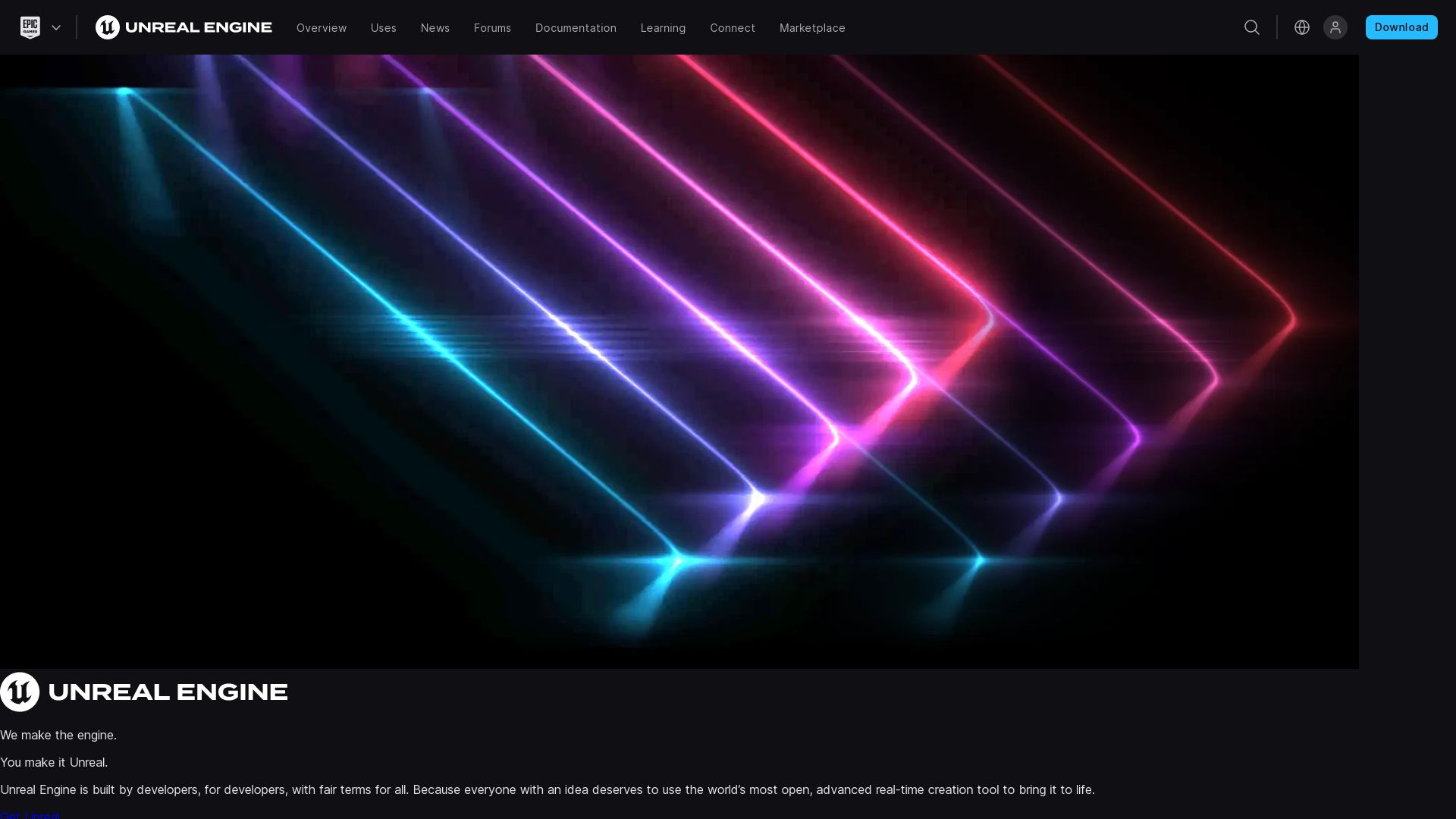
Developed by Epic Games, Unreal Engine (UE) is a line of sophisticated 3D computer graphics game engines, debuting in 1998 within the game “Unreal”. It champions a multiple platform, multiple genre approach, breaching film and television industries as well.
Unreal Engine Top Features
- Written in C++: Extremely versatile, the tool caters to desktop, mobile, console, and virtual reality platforms.
- UnrealEd – Level Editor: Capable of real-time constructive solid geometry operations.
- Unreal Development Kit (UDK): Supports the creation of iOS games and apps.
- Extensive Marketplace: Allows users to sell creations or purchase work of other developers, handing an 88% revenue share to creators.
| Features | Benefits |
|---|---|
| Quixel Integration | Improves visual quality |
| Project templates | Helps start first-person/third-person projects |
| Free for Education | Schools and universities can use it without incurring any charges |
Unreal Engine Downsides
- UE sports a steep learning curve, especially for beginners.
- Struggles with mobile games due to its heavy footprint.
Unreal Engine Pricing
UE is free to use and charges 5% of revenues over USD 1 million for commercial use. However, Epic waives this royalty model for games published on the Epic Games Store.
Unreal Engine Use Cases
Use case 1
UE proves valuable for developing visually rich and interactive Virtual Reality (VR) games, owing to its wide-ranging platform support and high-end rendering capabilities.
Use case 2
If you’re looking to create first-person shooters or third-person experiences, the robust project templates can give you a head start.
Use case 3
For academic institutions, Unreal Engine is a boon for teaching students about gaming development as it is free and comes with a host of features.
LÖVE
Integrating the art of freedom with technology, LÖVE is a free, open-source, cross-platform game framework dedicated for the development of video games and custom functionalities. Conceived on January 13, 2008, this framework utilizes C++ and is supplemented by Lua as a scripting language, presenting a cohesive blend of simplicity and power.
LÖVE Top Features
- Exceptionally cross-platform: Supports platforms like Microsoft Windows, macOS, Linux, Android, iOS.
- Robust support for OpenGL ES 2 and 3.
- Fonts rendered by the FreeType engine.
- Inclusion of OpenGL pixel shaders GLSL, touchscreen support, joystick interface, UTF-8.
- Provides hardware acceleration, multi-threading, and networking.
- Allows developers to modify their code and see changes in real time.
| Supporting Libraries | Provides access to video and sound functions of the host machine via libraries SDL and OpenGL. |
| Versions | Conductive to improvement, various versions have been released with added features, bug fixes, and enhancements. |
| Community | Offers tutorials, wiki page guide, resources through community forums, Discord server, and subreddit. |
LÖVE Limitations
Despite its versatility, currently, no major cons appear to counteract the efficacy of LÖVE. However, the technology and its capabilities remain open for further improvements and enhancements.
LÖVE Pricing
Adhering to the principles of open-source culture, LÖVE is available completely free of charge, advocating accessibility and broadening technological reach.
LÖVE Use Cases
Use case 1: Game Development Competitions
LÖVE is a favored tool in game development competitions like Ludum Dare due to its easy script editing and real-time changes.
Use case 2: Independent Game Development
Scaling 10th in popularity amongst independent developers on Itch.io (1.97% share- July 2018), LÖVE is ideal for creating unique games like Move or Die, Mari0, Kingdom Rush etc.
Use case 3: Teaching Programming
With a coherent blend of C++ and Lua, LÖVE serves as a conducive platform for teaching programming, especially game development.
Love2D
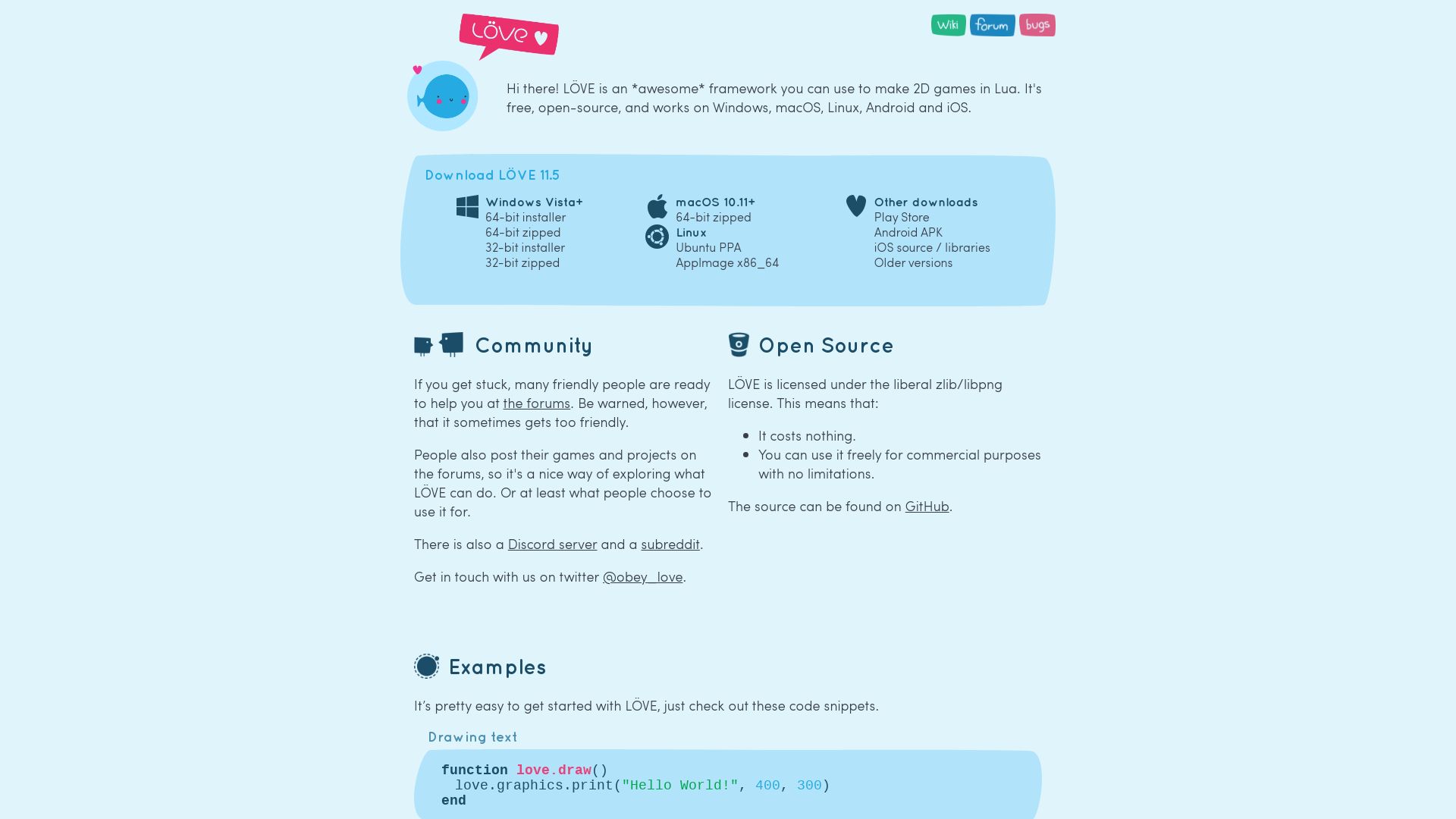
Gather round, tech enthusiasts; presenting Love2D, the open-source game framework that wears its heart on its sleeve. It’s been spreading the love since its launch on January 13, 2008. Let’s dive into its romantic universe.
Love2D Top Features
- Compatible heart: Love2D uses the Lua scripting language and supports operating systems from FreeBSD and OpenBSD to Windows, Linux, macOS, iOS, and Android.
- The voice of love: From video to sound functions, Love2D gives you the full multimedia experience.
- Adaptable heart: Who says love can’t be technical? Love2D supports OpenGL pixel shaders GLSL, UTF-8, and joystick controls, keeping you in control of your game development journey.
- Library love: It’s compatible with libraries SDL and OpenGL and even has a library date with Simple Tiled Implementation and anim8.
| Love2D Asset Support | Love2D Notable Games |
|---|---|
| Supports numerous audio formats like WAV, OGG, MP3, and image formats like PNG, JPEG, GIF etc | Move or Die, Mari0, Kingdom Rush |
| Has Box2D physics engine and LuaSocket library for network communication | BYTEPATH, Blue Revolver, Warlock’s Tower |
Love2D Disadvantages
- Although Love2D works cross-platform, different versions of Love2D might not play well together. It’s a bit like throwing a cat and dog in the same room and expecting them to be best buddies.
- Compared to heavy hitters like Unreal and Unity, Love2D could use a bit more power. It’s like bringing a knife to a gunfight.
- Its limited modules and lack of a graphical interface might make some developers feel like they’re playing a game with one hand tied behind their back.
Love2D Pricing
Get ready to fall head over heels because Love2D is freely distributed under the zlib License. Yes, you heard it right. Nothing says “I love you” like open-source.
Love2D Use Cases
Use case 1
Are you an indie developer? Love2D might just be your match made in heaven. With its robust features like OpenGL and Lua script support, you can bring your 2D gaming visions to life without digging a hole in your pocket.
Use case 2
Participating in a game development competition like Ludum Dare? Love2D’s simplistic nature and strong community support via its Discord server, IRC channel, and issue tracker might just get you the crown.
Use case 3
Want to dabble in game development as a hobby? Love2D with its intuitive installation via its website and plentiful Lua code snippets might just turn your hobby into a passion. Now everyone can find love in the gaming world.
Godot
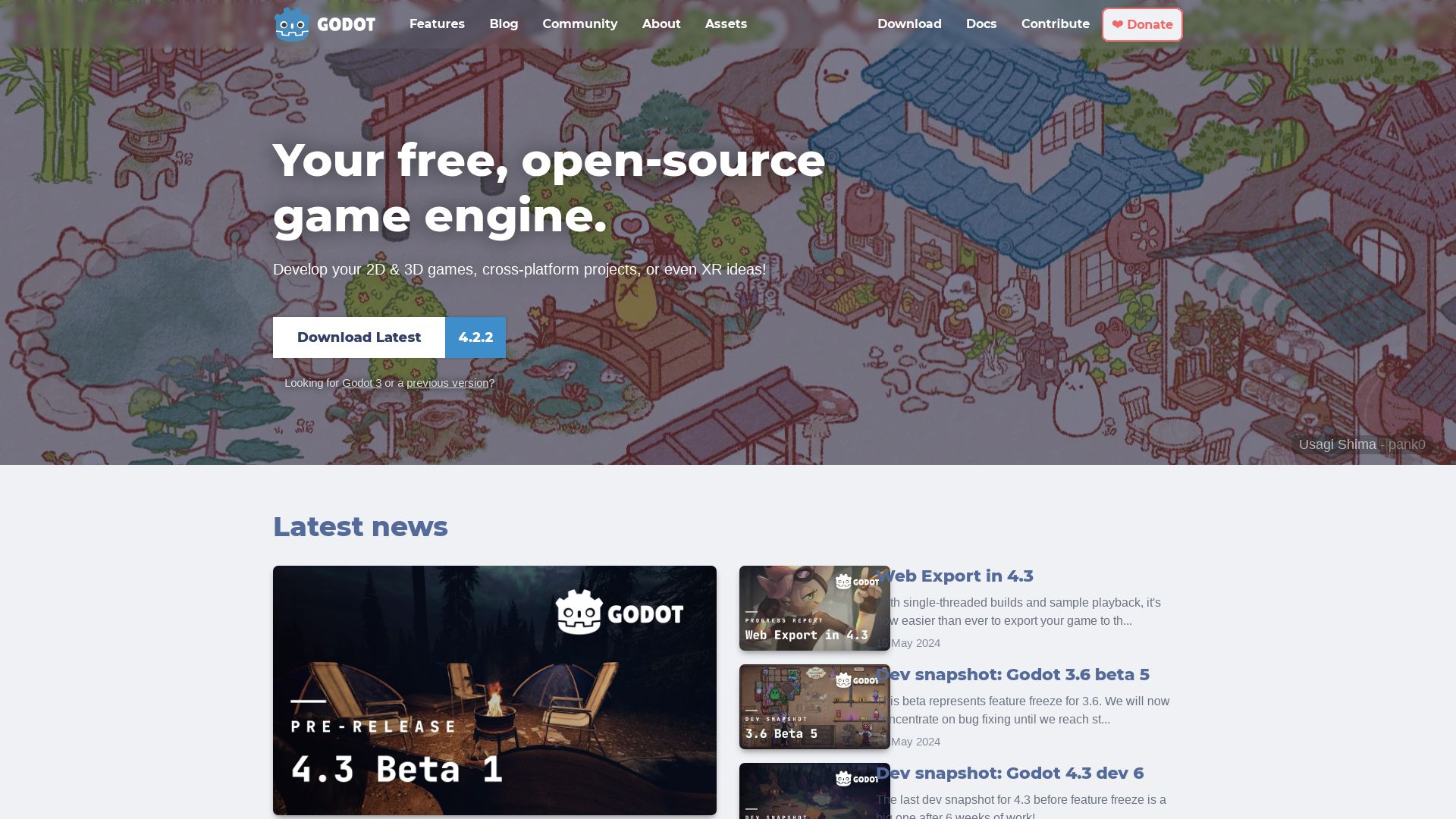
Embrace game development with Godot, an open-source game engine renowned globally for its intuitive scene-driven architecture and high flexibility. Designed for streamlined game logic, Godot provides powerful tools for both novice and experienced developers.
Godot Top Features
- Open-Source and Free: No licensing fees, no contracts, or hidden costs.
- Intuitive Design: Scene-driven that allows game creation from simple building blocks using nodes.
- Scalable: Scenes can be combined into complex, full-featured components.
- High-end and Low-end Devices: Its 3D engine supports a wide range of devices while still maintaining performance.
- Languages Supported: Support for GDScript, C++, and C# with community support for other languages.
A deeper look into Godot’s Features
| Import Flexibility: | Allows direct import of Blender files. |
| 2D Workflow: | Specialized 2D workflows for game and app development. |
| Modifiable Codebase: | Being open source, its codebase is customizable, allowing for intricate design changes. |
Godot Limitations
- Complex 3D game development may prove challenging due to engine constraints.
- .NET platform is only available for desktop in Godot 4.
Godot Pricing
Perhaps one of the most appealing aspects of Godot is its pricing – it’s absolutely FREE. As an open-source engine, it fosters community development with no licensing fees or hidden costs.
Godot Use Cases
Use case 1 – Indie Game Development
Godot’s intuitive design is perfect for indie game developers. Its use of scenes as building blocks provides a convenient workflow for smaller projects.
Use case 2 – Educational Purposes
With its free and open-source nature, Godot is an excellent choice for educational settings as it allows students to explore game development without financial constraints.
Use case 3 – Rapid Prototyping
Godot’s ability to import Blender files directly and the customization it provides makes it a perfect choice for rapid game prototyping.
GameMaker
Dive into the vibrant realm of 2D game creation with GameMaker. Simplicity marries scalability in this game design engine, ideal for both rookies and seasoned developers. Hailed for its exhaustive toolkit, GameMaker has powered the birth of indie marvels like Undertale, Spelunky, and Hotline Miami.
GameMaker Top Features
- Exceptionally user-friendly interface with a strong emphasis on simplicity and scalability.
- Expanded support for extra languages like Shader Languages (GLSL, HLSL, etc), JSON, and XML.
- Tools for incorporating user-generated content to games via Mod.io extension.
- Promising future updates like an overhauled code editor, AI support, and modding enhancements.
- Standout community development and customer support.
| Feature | Bonus |
|---|---|
| Language Server for Syntax Highlighting and Intellisense support | Additional language support in the Code Editor. |
| Mod.io extension | Smooth integration of user-generated content to your game. |
| Community love | Constant balancing of engine updates based on feedback. |
GameMaker Limitations
- Currently constrained to 2D game creation, limiting the scope for developers who prefer 3D environments.
- Pending the introduction of promised upgrades such as AI support and new code editor.
GameMaker Pricing
GameMaker’s pricing structure offers options for everyone – from hobbyist to professional. There’s a free version for beginners, while the Creator, Indie, and Enterprise variants offer additional capabilities for developing personal games, indie releases, and studio releases respectively.
GameMaker Use Cases
Beginner Game Developers
The ease of use and simplicity offered by GameMaker makes it a stellar choice for newcomers stepping into the game development world. Its user-friendly interface and bundled tools pave the way for a less intimidating introduction to game creation.
Pro Indie Developers
For indie developers looking to create the next indie hit, GameMaker fosters an environment that promotes creativity and efficiency. Its adaptability and scalability serve to accentuate your innovative ideas in the most dazzling way.
Game Development Studios
Big or small, GameMaker offers a reliable platform for studios to create engaging 2D games. With its promised updates and community-driven improvements, GameMaker isn’t just a development tool – it’s a solid development partner.
Solar2D
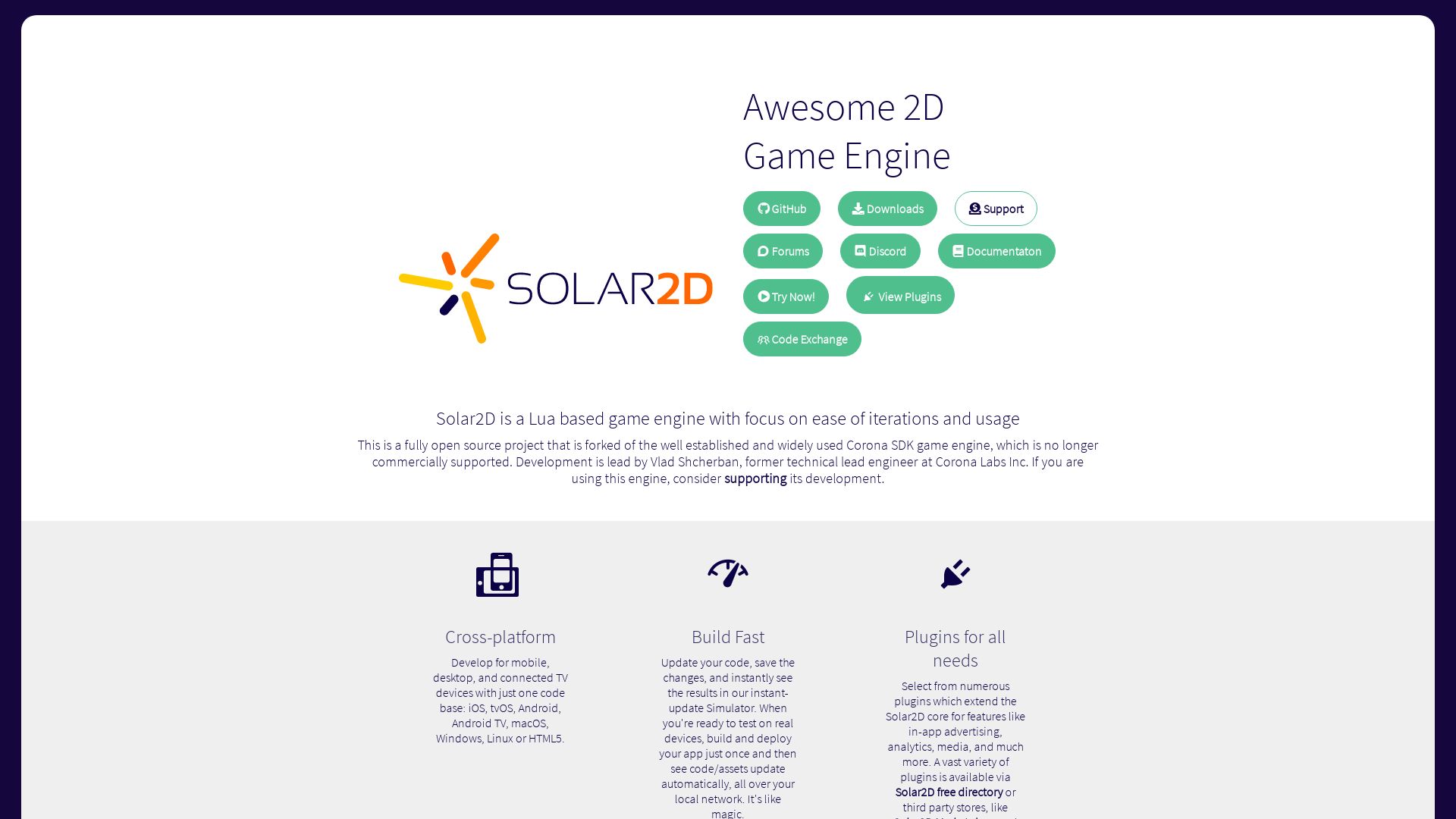
Box the norms, embrace the maverick ways, meet Solar2D, the powerhouse of cross-platform app development. Born as Corona SDK, Solar2D has morphed over a decade into a force to be reckoned with.
High-Voltage Solar2D Features
- One code base for mobile, desktop, TV devices – no discrimination!
- Real-time testing with a lightning-fast Simulator that updates as you tweak the code or assets.
- A plush lineup of plugins for advertising, analytics and media.
- Native libraries/APIs access to C/C++/Obj-C/Java through Solar2D Native.
- A free, no-strings-attached platform with top-notch privacy – no tracking, no data mining.
| Key Feature | Benefit |
|---|---|
| Lua | Resilient, proven language in gaming, adopted by giants like Warcraft and Angry Birds. |
| Open Source | MIT-Licensed, Solar2D lets you tinker rebelliously with its code. |
| Vibrant Community | A 10-year-strong community of peers and pioneers, ready to back and boost you. |
Pitfalls of Solar2D
Hold your horses! Here’s the dirt. Details could be scanty due to the open-source nature of this platform. Also, if you are a hardened fan of conventional languages, Lua might prove to be an annoying acquaintance at first glance. But fear not, its simplicity will win you over soon.
The Price of Rebellion – Solar2D Pricing
The rebel takes your side. Solar2D is 100% free! This open-source extravaganza of easy development costs you zilch, no hidden fees, no royalties. They’re privacy freaks like you – no data hoarding, no tracking.
Who Benefits from the Solar2D Rebellion?
App Developers with Limited Resources
If you find joy in being a renegade yet have a thin stretch of resources, Solar2D is your co-conspirator. Its cost-efficiency, time-saving single code base, and instant-update Simulator speed up app development.
Beginners in Game Development
No courage, no change! If you’re new to game dev and wish to throw caution to the wind, this engine – powered by Lua and a supportive community – is your ticket into the big league.
Experienced Developers
Coder-veterans, behold! Dive into Solar2D’s rich plugin environment, leverage its powerful APIs and fast frame rate to deliver cutting-edge application experiences across a multitude of platforms.
Construct
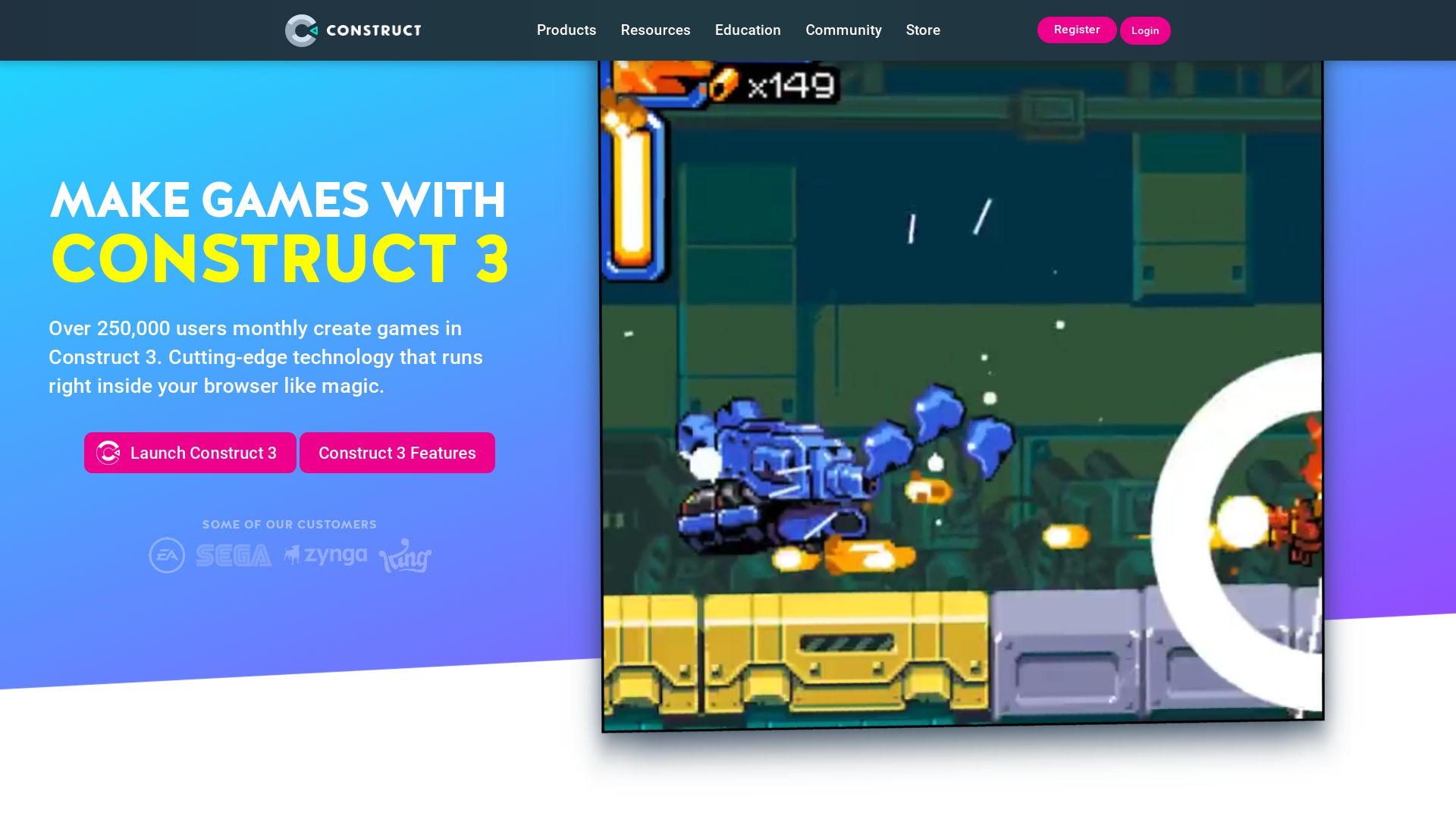
Construct, produced by Scirra Ltd, is an HTML5-based 2D game engine designed primarily for non-programmers. It leverages visual programming for swift game creation and supports various platforms.
Construct Top Features
- Quick game creation: Enabled by intuitive visual programming.
- Event Sheet programming: Uses ‘event sheets’ that are similar to source files in typical programming languages.
- Multimedia Support: Supports DirectX and NW.js technologies.
- Spectrum of Platforms: Compliant with multiple platforms, supporting both native and web applications.
- JavaScript Support: Upgraded its core tech in 2019 to include JavaScript as a scripting language.
| Feature | Description |
|---|---|
| Export Targets | Includes popular web and mobile browsers, Xbox One, and Xbox Series X and S. |
| Expanded Editor | Included in Construct 3 is an official plugin SDK for widened editor functionality. |
| Free Programming | Offered in Construct 3 to stimulate creativity and endless game development possibilities. |
Construct Limitations
- Constant API transitions may require regular recoding for developers.
- Reliance on visual programming may limit flexibility for advanced game programmers.
Construct Pricing
While Construct 2 was offered with a pay-once model, Construct operates under a subscription-based approach.
Construct Use Cases
Use case 1: Non-programmers
Utilized by non-programmers for easy and quick game creation given its robust visual programming.
Use case 2: Indie developers
Chosen by Indie game developers due to its wide-ranging platform compatibility and expanded editor functionalities.
Use case 3: Education
Used in educational contexts because of its systematic learning approach, involving checkpoints and tests in the Hub.
Construct 3
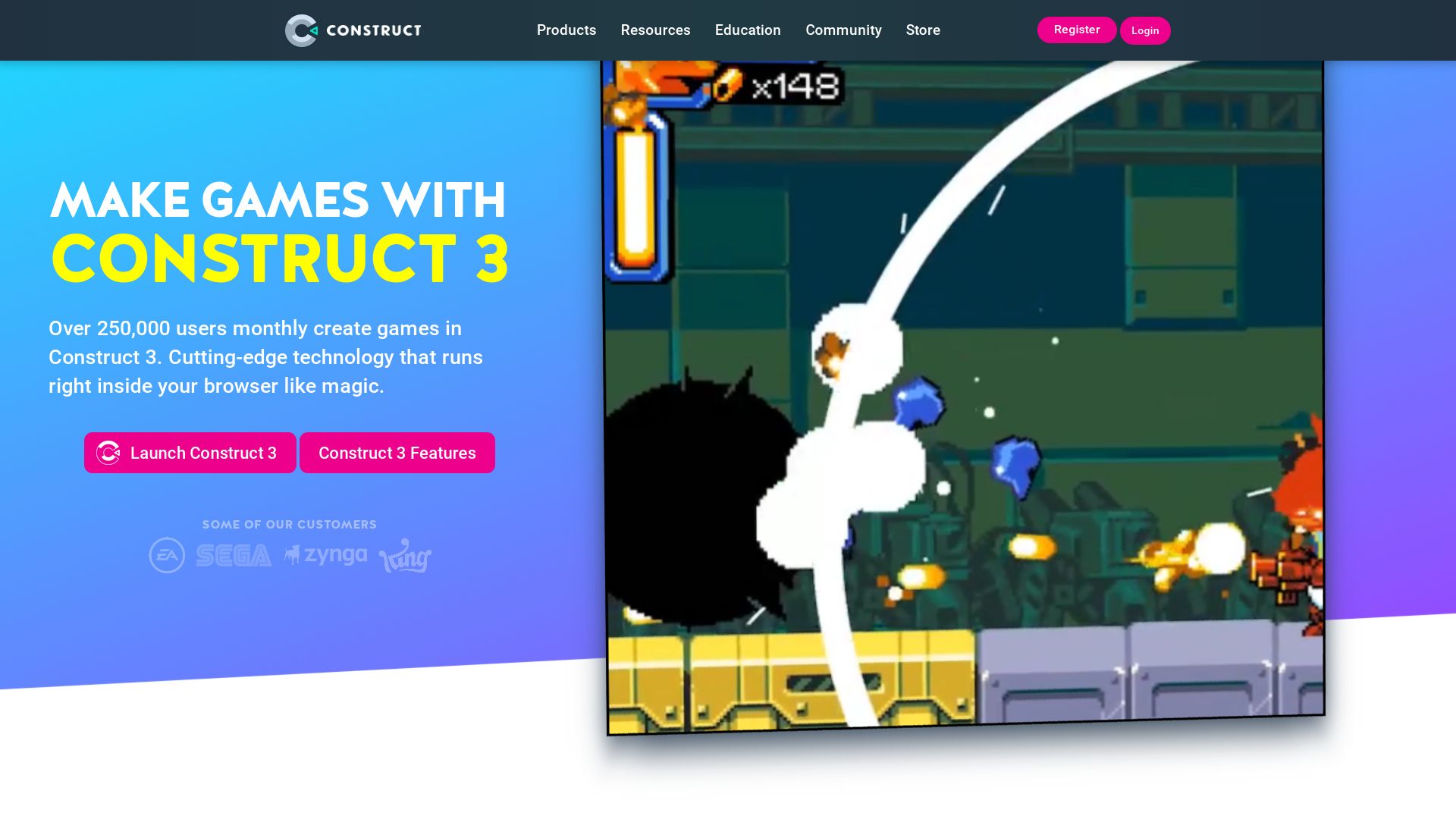
Powered by Scirra Ltd, Construct 3 is an innovative HTML5-based 2D game engine that favors beginners and professionals alike. Notable for its utilization of ‘event sheets’ for visual programming, its facilitates quick and easy game creation.
Construct 3 Top Features
- Event Sheets: Visual programming made possible by ‘Event Sheets’, eliminating the need for deep coding expertise.
- Browser Flexibility: Accessible on any device, from Google Chrome to Safari, while supporting offline use.
- Pixel Editor: In-built pixel editor for smooth graphic creation.
- Support of Behaviors: Provides strong support for various game behaviors including platformer, tile movement, anchor, and more.
- JavaScript Integration: Added in May 2019 to cater to advanced user needs.
| Web-Based: | Unlike its predecessor Construct 2, Construct 3 is a web-based application, facilitating greater accessibility. |
| Data Privacy Compliance: | Complies with established data privacy regulations such as COPPA, CCPA, and GDPR. |
| Educational Use: | Popular in educational institutions, used for teaching coding in 400 schools across 48 states in the US. |
Construct 3 Limitations
- Designed for 2D Games: Not suitable for 3D game development.
- Limited Application Support: Does not support offline and native apps, limiting its use on platforms like Apple TV.
- Large Game Constraints: Fails to meet the demands of developing large-sized games.
Construct 3 Pricing
Construct 3 operates on both a free license and a paid subscription model. The paid version of Construct 3 starts at a cost of $99/year offering additional features for advanced users.
Construct 3 Use Cases
Use case 1 – Game Developers
Construct 3, equipped with a user-friendly interface and versatile features like pixel editor, JavaScript integration, and support for different behaviors, is ideally suited for game developers looking to expedite 2D game development.
Use case 2 – Educational Institutions
Preferring Construct 3 for coding curriculum delivery, its easy programming, and downloadable feature for regions with poor internet connectivity, makes it a valuable tool for educators.
Use case 3 – Indie Developers
With solid HTML5 support, Construct 3 offers a robust platform for Indie Developers aiming to create games or playable ads that can be seamlessly exported and utilized across several platforms.
Phaser
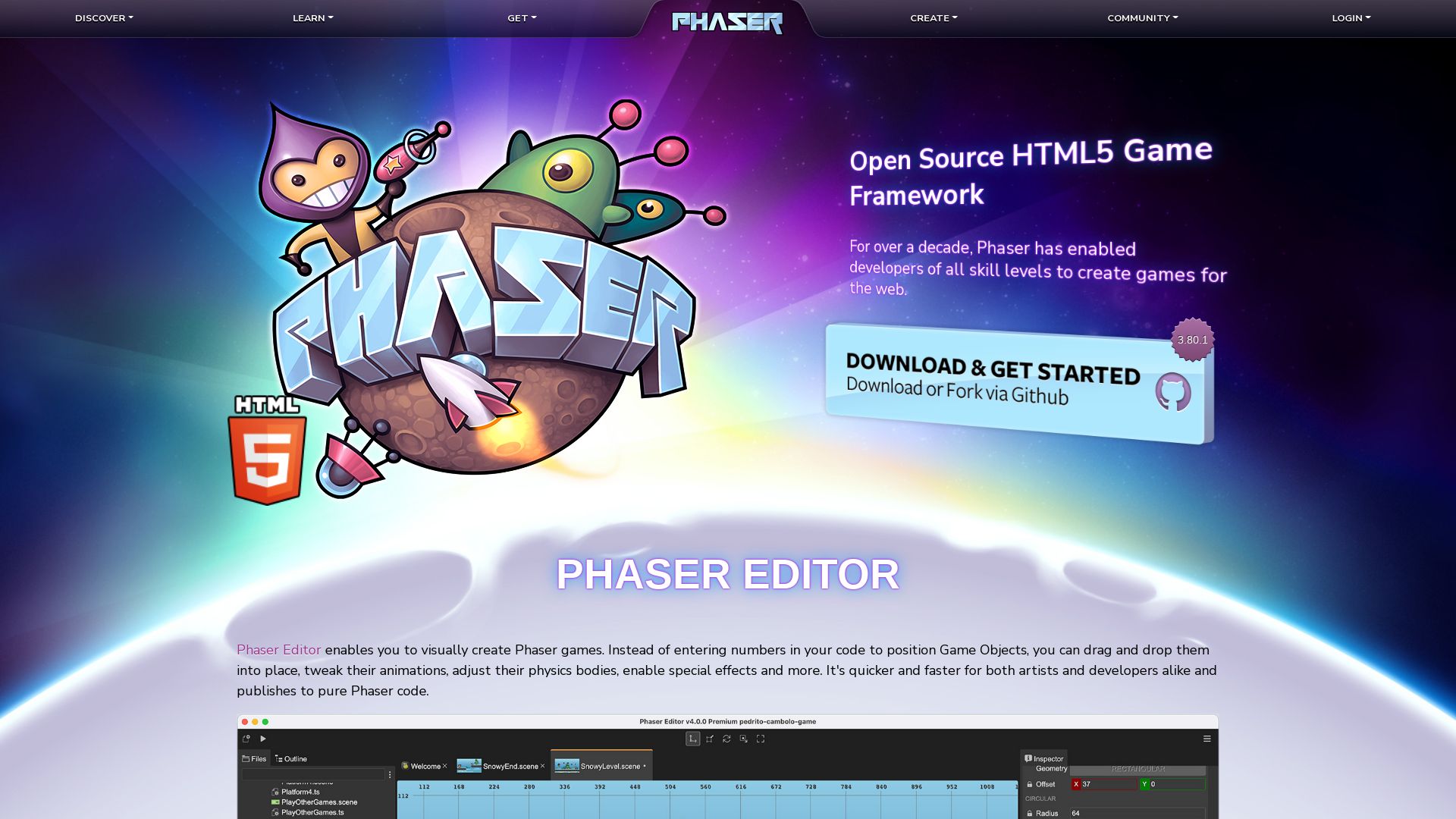
Let’s explore Phaser, a versatile 2D game framework designed for creating interactive HTML5 games on both mobile and desktop platforms. Developed by Richard Davey, Phaser first came onto the scene in April 2013 and has been enhancing game development ever since.
Phaser Top Features
- Written in JavaScript and TypeScript, offering developers a familiar and accessible coding platform.
- Canvas and WebGL renderer provide quick rendering, with an auto-switch capability based on browser support.
- Games can be deployed on a wide range of platforms including iOS, Android, and native desktop apps via tools like Apache Cordova and PhoneGap.
| Feature | Details |
|---|---|
| Interoperability | Compatible with any browser supporting canvas elements |
| Sound Playback | Web and HTML5 audio for crisp, engaging sound effects |
| Physics Systems | Multiple options with Arcade Physics, Ninja Physics, P2.JS |
Phaser Limitations
- Limited to 2D games only.
- May require additional platforms for deploying as native apps.
- The interface may be challenging for non-coders.
Phaser Pricing
Phaser is Open Source and available freely for use by developers worldwide.
Phaser Use Cases
Use case 1
Phaser provides a valuable starting point for game development. Its versatility and well-supported learning resources, such as the Phaser Mini-Degree from Zenva Academy, make it an excellent choice for beginners.
Use case 2
For those wanting to create browser-based games, Phaser supports iPhone, Android, and desktop platforms making game development and deployment relatively seamless.
Use case 3
Given its compatibility with the canvas element, Phaser is suitable for use in creating interactive, engaging games for educational purposes, stimulating visual learners effectively.
Babylon.js
An exquisite illustration of state-of-the-art 3D web engine technology is Babylon.js. Born from the creative mind of David Catuhe, taken to heights by Microsoft and other contributors, it was initially released in 2013 and has been consistently upgraded to its current stable release, version 5.3.0. Created using TypeScript and JavaScript, Babylon.js has the repository hosted at github.com/BabylonJS/Babylon.js under Apache License 2.0.
Babylon.js Top Features
- Creators work with the polygon modeling method, exploiting triangular faces.
- The API extends access for user projects.
- Animations tool for creating character animations through skeletons and blend weights.
- Real-world physics simulations using physics engines like Cannon.js and Oimo.
| Rendering | Models are rendered on HTML5 canvas element, coloring and pixel placement implemented by shader program. |
| Contributors | As of 2018, over 190 active contributors, including celebrated artist Michel Rousseau. |
| Compatibility | HTML5 and WebGL compliant, effortlessly understood by facilitating browsers. |
Babylon.js Limitations
- Limited usage of constructive solid geometry.
- Playable on HTML5 and WebGL compliant browsers only.
Babylon.js Pricing
Babylon.js is open source and free-to-use, with its source code accessible on Github under Apache License 2.0, elucidates its central philosophy of shared technological growth.
Babylon.js Use Cases
Use case 1 – Virtual Worlds
Building detailed and immersive virtual worlds using Babylon.js unlocks an endless universe of possibilities in the gaming industry.
Use case 2 – Education in Medicine
Synergizing technology with medicine, Babylon.js is instrumental in medical education, revolutionizing the conventional methods.
Use case 3 – Military Training
Simulating combat scenarios accurately, Babylon.js proves to be a technological marvel in modern military training.
GDevelop
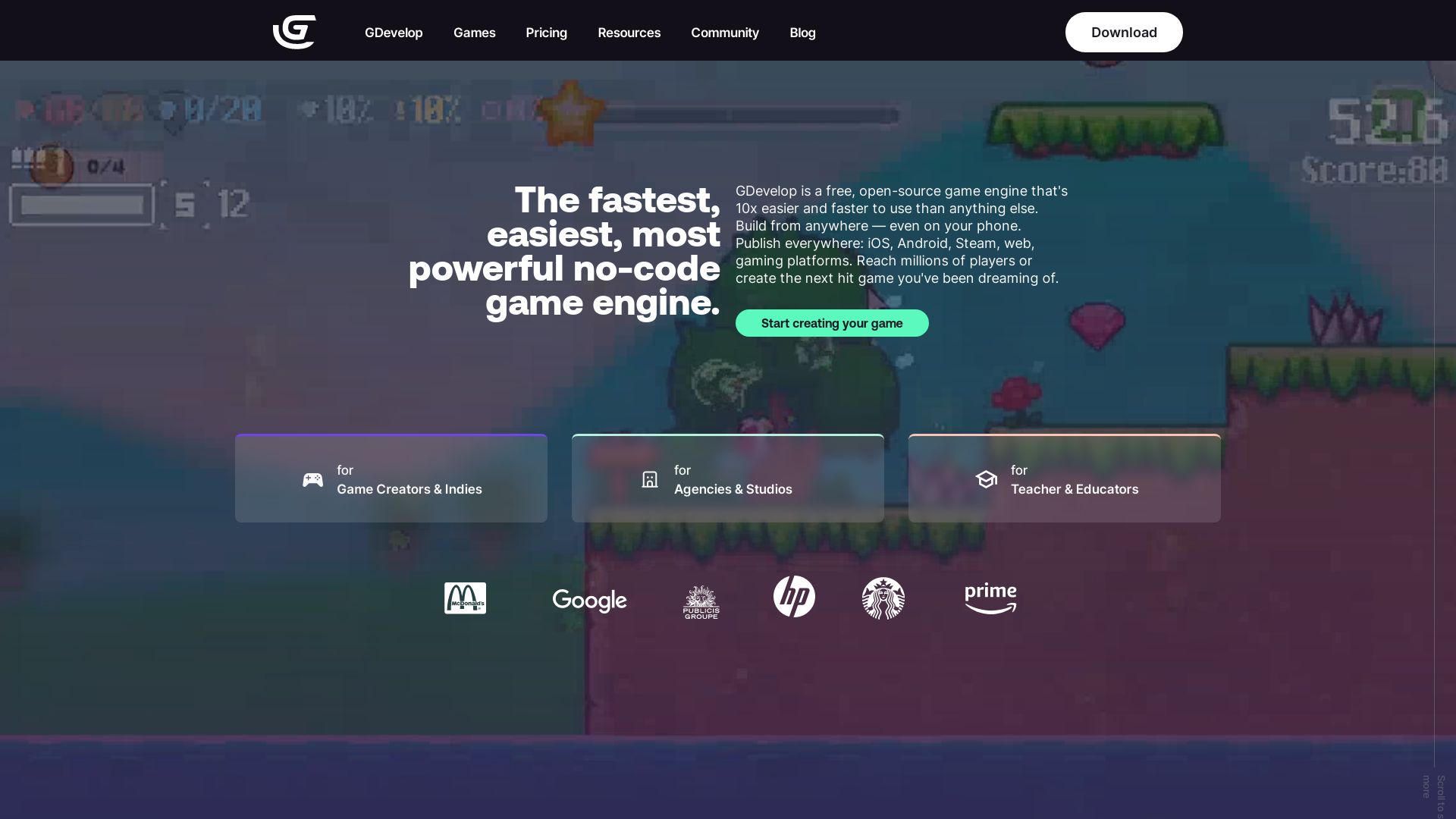
An exceptional creation molded in the form of an open-source, cross-platform game engine, GDevelop is the brainchild of Google software engineer Florian Rival. Its focus lies in the realm of PC, mobile, and HTML5 games. Tailored for an audience as diverse as non-programmers and experienced coders, this gem employs event-based visual programming for its crafts.
GDevelop Top Features
- Scripting, animation, visual effects, sound design: the cornerstone features for efficient game creation.
- Compatible with Windows, macOS, Linux; and can operate in a web browser for versatile accessibility.
- GDevelop games can be published to PC, Web, Mobile platforms for widespread distribution.
- Utilizes objects, and component pieces of code (events and behaviors) for effective game creation.
- It provides advanced features for crafting stunning 3D graphics and animations.
- Developers can truly make GDevelop their own by altering almost anything in the program and contributing to the software’s development.
| Fundamental concepts: | Coordinates, variables, and coding logic in game design. |
| Project management: | Planning, testing, publishing, reviewing, and understanding UI and UX are part of the results. |
| Target audience: | Primarily intended for learners, owing to its lightweight and user-friendly attitude. |
GDevelop Limitations
- More advanced users may experience slower development and less stability.
- May lack some of the advanced functionalities offered by other commercial engines.
GDevelop Pricing
GDevelop breaks the mold as it is offered completely free of charge. For those wondering about monetization, their creations can be monetized, proving it to be a convenient and economically friendly choice.
GDevelop Use Cases
Use case 1
Those wishing to venture into the realm of game design can start with GDevelop. Its intuitive, powerful event-based system simplifies game logic creation and offers an easy introduction to the fundamentals of game programming.
Use case 2
Educators can leverage GDevelop for teaching game development. From schools to university courses, its ability to create learning or serious games it an efficient educational tool.
Use case 3
Experienced coders can delve into advanced 3D graphics and animation with GDevelop’s advanced features, thereby broadening their skillset while enjoying creative freedom.
Logan Bellbrook
Content writer @ Aircada with a knack for nature & AR/VR/XR. Blogging the intersection of tech & terrain.




